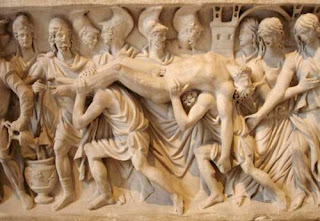Homer's Song

In 1990, the Colombian Ministry of Culture set up a system of roaming libraries to take books to the inhabitants of distant rural regions, in the jungle and the sierra. Here the books were left for several weeks in the hands of a teacher or village elder who became, in effect, the librarian in charge.
Most of the books were technical works, agricultural handbooks, collections of sewing patters and the like, but a few literary works were also included. According to one librarian, the books were always safely accounted for.
"I know of a single instance in which a book was not returned," she said. "We had taken, along with the usual practical titles, a Spanish translation of the Iliad. When the time came to exchange the book, the villages refused to give it back. We decided to make them a present of it, but asked them why they wished to keep that particular title. They explained that Homer's story reflected their own: it told of a war-torn country in which mad gods mix with men and women who never know exactly what the fighting is about, or when they will be happy, or why they will be killed. "
- Alberto Manguel, "Homer's The Iliad and The Odyssey, A Biography"
Most of the books were technical works, agricultural handbooks, collections of sewing patters and the like, but a few literary works were also included. According to one librarian, the books were always safely accounted for.
"I know of a single instance in which a book was not returned," she said. "We had taken, along with the usual practical titles, a Spanish translation of the Iliad. When the time came to exchange the book, the villages refused to give it back. We decided to make them a present of it, but asked them why they wished to keep that particular title. They explained that Homer's story reflected their own: it told of a war-torn country in which mad gods mix with men and women who never know exactly what the fighting is about, or when they will be happy, or why they will be killed. "
- Alberto Manguel, "Homer's The Iliad and The Odyssey, A Biography"


Comments